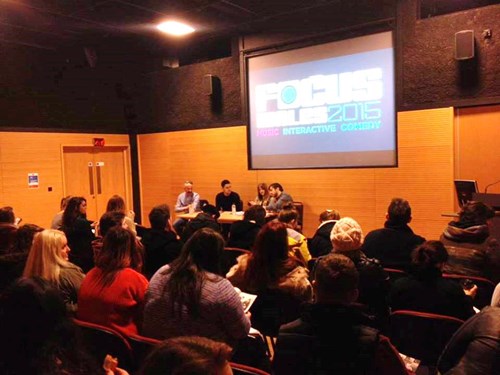Group Size
?
1.) Small group (teams of 4-6)
2.) Individual Task
3.) Large Group
4.) Any
Large Group
Learning Environment
?
1.) Lecture Theatre
2.) Presentation Space
3.) Carousel Tables (small working group)
4.) Any
5.) Outside
6.) Special
Lecture Theatre
QAA Enterprise Theme(s)
?
1.) Creativity and Innovation
2.) Opportunity recognition, creation and evaluation
3.) Decision making supported by critical analysis and judgement
4.) Implementation of ideas through leadership and management
5.) Reflection and Action
6.) Interpersonal Skills
7.) Communication and Strategy
2Opportunity recognition‚ creation and evaluation
6Interpersonal Skills
It’s essential for students of music, music technology and associated courses, that they have a working knowledge of their industry, a strong network of professional contacts, and the ability to draw upon their subject specific knowledge and understanding, to identify and create opportunities for themselves.
Panel events are one way of providing such opportunities to students.
As part of the ‘Creative Futures 2015’ conference at Glyndwr University, a panel event was held on the subject of the developing successful festivals and events in the music industry. The panel was organised with the support of Focus Wales music festival, who supplied a panel consisting of festival managers, marketers, performs and coordinators.
The panel session ran for 1 hour, was delivered to a group of approximately 50 students from various programmes and years of study, and was mediated by a member of the University’s enterprise team.
Pre-Activity
Introduction
Discussion Topics & Q and A
Closing Remarks

The session served to be valuable both of the University, and to the panellists. It strengthened the relationship between the University and the locally based music event, and a number of student attendees went on to seek voluntary and paid opportunities with the festival. It helped the festival to raise its profile with the University population, and highlighted to students the opportunities available on their doorstep.
As a direct result of the panel session, the University collaborated in facilitating panel sessions at Focus Wales own conference for music industry professionals, which a number of University students attended.
For the learners, this was the first opportunity many had to speak directly with the organisers of a large scale music industry event. The session helped the learners to gain a more realistic understanding of the working of the music industry, the access routes into it, and the opportunities which may be available to them.
Through their questioning, the learners were able to fill the specific gaps in their own personal knowledge and understanding and through informal networking after the session, develop their interpersonal skills and establish valuable contacts.